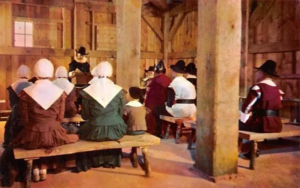 You may recall the sad saga of Rev. John Lyford we chronicled in the June e-news of this year. In summary, the Pilgrim congregation in Plymouth had been taught by Pastor John Robinson in Leyden to discern the character of their leaders, not just their knowledge. This is why it took a while for the church to confirm a pastor.
You may recall the sad saga of Rev. John Lyford we chronicled in the June e-news of this year. In summary, the Pilgrim congregation in Plymouth had been taught by Pastor John Robinson in Leyden to discern the character of their leaders, not just their knowledge. This is why it took a while for the church to confirm a pastor.
When John Lyford arrived in early 1624, it did not take long for his lack of character and wisdom to be exposed. It is one thing to expose such an individual, but another thing to properly, graciously, yet firmly confront and resolve such a situation. After the pattern of discord was dealt with through loving confrontation and an open court took place, Bradford reported, “The court censured them to be expelled from the place.”
The Bible says in Ephesians 4:3 “to keep the unity of the Spirit in the bond of peace.” In any family, church, or nation, the ingredients necessary to preserve unity are lowliness, gentleness, and longsuffering in preserving relationships (see Eph. 4:2). Lyford’s discord would have had little effect if all the people consistently went directly to the one offended in a spirit of humility. If then, after doing so with no effect, they took one or two witnesses who were parties to the same offense to confront Lyford, the discord would not have spread and there may have been no need for an open court to convict him.
 But unfortunately, the year was to end the way it began, with more drama of discord, challenging all to preserve unity. Lyford was given six months before he must leave, but his wife and family could stay all winter until he got them a place to live. He confessed his sin publicly in church, stating:
But unfortunately, the year was to end the way it began, with more drama of discord, challenging all to preserve unity. Lyford was given six months before he must leave, but his wife and family could stay all winter until he got them a place to live. He confessed his sin publicly in church, stating:
“That he had done very evil, and slanderously abused them; and, thinking most of the people would take part with him, he thought to carry all by violence and strong hand against them. And that God might justly lay innocent blood to his charge, for he knew not what hurt might have come of these his writings, and blessed God they were stayed. And that he spared not to take knowledge from any, of any evil that was spoken, but shut his eyes and ears against all the good; and if God should make him a vagabond in the earth, as was Cain, it was but just for he had sinned in envy and malice against his brethren as he did. And he confessed three things to be the ground and causes of these his doings: pride, vain-glory, and self-love.”
But preserving unity, and following the biblical injunctions, do not guarantee results without vigilance and “bearing with one another in love” to be on guard against false accusations on one hand, and cheap confessions on the other. It is easy to speak, but harder to act consistently in line with one’s confession. Bradford wrote, “So as they began again to conceive good thoughts of him upon this his repentance, and admitted him to teach amongst them as before… some tenderhearted men amongst them, were so taken with his signs of sorrow and repentance, as they professed they would fall upon their knees to have his censure released.”
How could people be so deceived? We cannot merely take confessions of others as true without the time it takes to see that the individual’s character (and habits of behavior) have begun to change. We cannot preserve unity by pretending that all is well, without the time it takes to rebuild trust. It has always been true that what you are speaks louder than what you say. Bradford related the following:
“But that which made them all stand amazed… that after a month, or 2, notwithstanding all his former confessions… with so many tears & sad censures of himself, before God & men, He should go again to Justify what he had done…. secretly he writ a 2nd letter to the adventurers in England….”
 This second letter to the Adventurers, and Plimoth’s answers, were these:
This second letter to the Adventurers, and Plimoth’s answers, were these:
Lyford wrote, “…I do freely confess I dealt very indiscreetly in some of my particular letters….” Though Lyford attempted to apologize to the Adventurers, Bradford wrote, “All his sorrow and tears was for the wrong and hurt he had done us.” Speaking out of both sides of one’s mouth, so to speak, is illustrated in Proverbs 4:24, which says, “Put away from you a deceitful mouth.”
Bradford explained that Lyford “complains that we have changed his wages ten times. We never agreed with him for any wages.” He was treated, in the Pilgrims’ eyes, “far better than he deserves… he hath ever had a larger allowance of food out of the store for him and his than any…. What cause he hath, therefore, to complain… we know not.” James 5:9 says, “Do not grumble against one another… the Judge is standing at the door!” Lyford’s character of discord was exposed for all to see!
Bradford continued, “…With an impudent face he would have you take notice… he hath writ nothing but what is certainly true… this indeed doth astonish us and causes us to tremble at the deceitfulness and desperate wickedness of man’s heart.” As Jeremiah 17:9 declares, “The heart is deceitful… and desperately wicked.” Bradford writes, “…All his soothing is but that you would use means that his censure might be released.” As Numbers 32:23 declares, “Be sure your sin will find you out.”
Finally, Bradford related, “Next he falls upon the church… that the Lord hath not appointed any ordinary ministry for the conversion of those without (serving solely for converting others)… “he perverts the truth… for the Lord hath as well appointed them to convert, as to feed…. They have had no ministry since they came (an ordained pastor to distribute the sacraments). “…Our reverend Elder (Brewster, not ordained) hath labored diligently in dispensing the Word of God to us.” Bradford even related that William Brewster allowed Lyford to preach rather than himself as a show of respect!
The amount of time it took during the year 1624 to deal with John Lyford and the faction he created was an act of longsuffering. Some have considered Lyford an obsession of Bradford (in an unhealthy, competitive way). However, consider what Bradford wrote as to how God used this, “…Many who before stood something off from the church, now seeing Lyford’s unrighteous dealing with malignity against the church, now tendered themselves to the church and were joined to the same… and so these troubles produced a quite contrary effect, in sundry here, than these adversaries hoped for.”
That reuniting of individuals back to fellowship was a blessing, for resolving relationships is the heart of manifesting the Kingdom on earth as it is in heaven (see Matthew 6:10; 16:15-20, and 18:15-20). If Christ can’t use us as ambassadors to bring reconciliation, what hope is there of seeing such a work occurring in the culture around us? That is why God says that judgment (correction) begins at the house of God (1st Peter 4:17). What happens in the church affects the nation!







